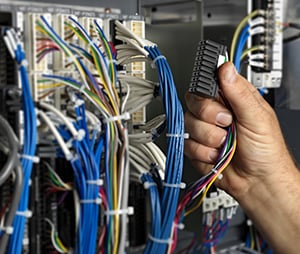7 Facts CNC Shops Should Know About Heat, Humidity & Electronics
 Summer is upon us and, in most parts of the country, that means heat and humidity are on the rise. For CNC machine shops, increasing temperatures and humidity levels are more than a physical discomfort. They represent a real danger for the electronic components of machine tools, computers and other shop equipment.
Summer is upon us and, in most parts of the country, that means heat and humidity are on the rise. For CNC machine shops, increasing temperatures and humidity levels are more than a physical discomfort. They represent a real danger for the electronic components of machine tools, computers and other shop equipment.
Jason Balsbaugh of Gosiger’s parts department knows only too well about the affects of heat and humidity on customer’s electronics. “We see a sharp increase in requests for various electronic parts during the summer months, and many of these parts fail because they are exposed to high heat and humidity.”
With this in mind, we asked Jason to share some helpful facts on this subject:
- Important terms to understand: Relative Humidity refers to the amount of water vapor in the air as compared to the maximum amount of water vapor the air can hold without condensing. Dew Point is the temperature at which moisture turns from vapor into liquid. When the Weatherman talks about relative humidity approaching the dew point outside, you can be sure the atmosphere inside your CNC shop will also be affected.
- Typical heat and humidity related problems include: switch contacts that become oxidized and begin arcing; capacitors, transistors and other components that experience current leakage, and decreased insulation resistance that leads to shorts, overall loss of conductivity, and changes in resistance.
- High humidity in a CNC machine shop can cause moisture to condense on electronic components resulting in corrosion.
- Very low humidity, on the other hand, creates static electricity, which can also adversely affect electronic devices.
- As ambient temperature increases, so does the amount of humidity the air can hold. Therefore, if the temperature in a CNC shop is quite high, and the percentage of humidity is moderate, say, around 50%, there is still a lot of moisture present, which is why it feels so uncomfortable. As a result, shops must control both heat and humidity to prevent electronics from damage.
- If the temperature in the shop is reasonable, a good level of humidity is about 55%.
- Keeping a CNC machine shop’s temperature and humidity in balance can be a challenge. A qualified HVAC expert can solve the problem through adequate air exchange, central air conditioning and dehumidifier systems.
It may not always be possible to maintain optimum temperature and humidity in your shop, but the closer you can come to that goal, the better the odds that your electronic devices will have long and healthy lives.